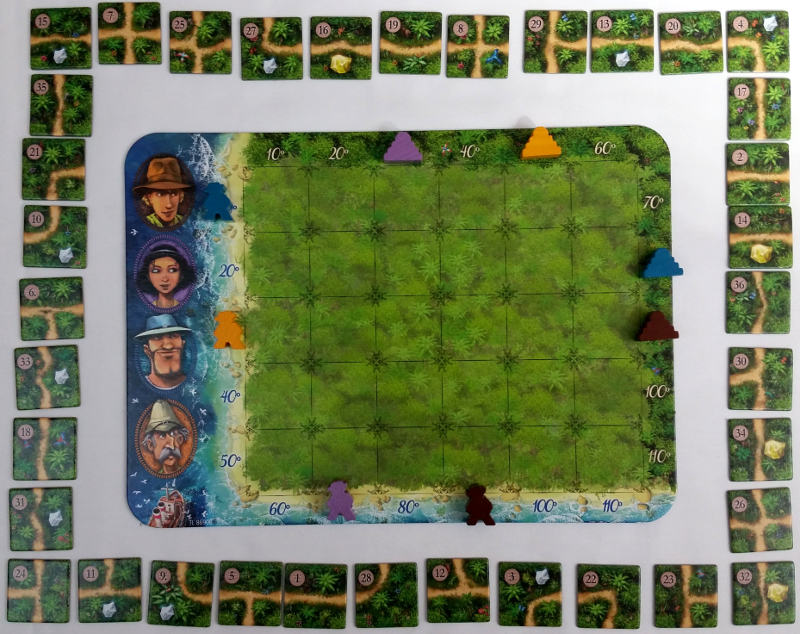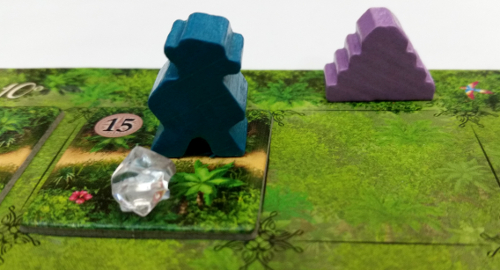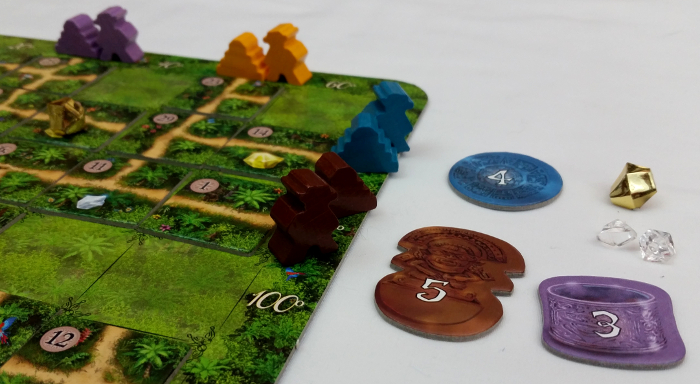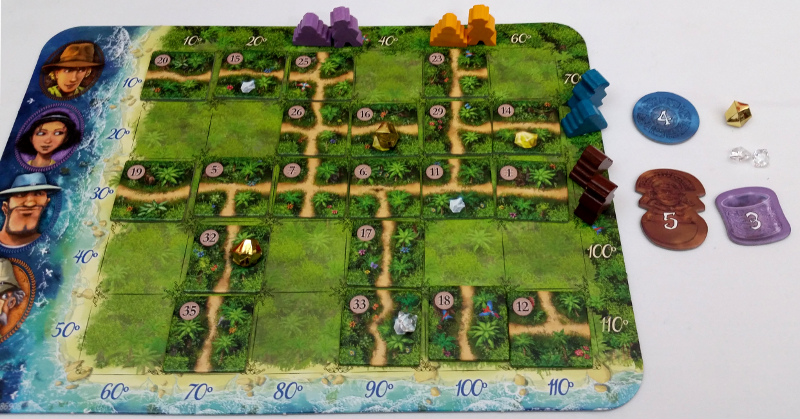Editor’s Note: Karuba is the third Rundown Review, a new subset of reviews that allows us to provide an Archetype breakdown on games when a normal comprehensive review isn’t possible or necessary. You can read more here for details.
The Overview
After a long and extensive journey, players have arrived at the long lost lands of Karuba. In this lightweight tile game, each player leads a team of adventurers into the dense and overgrown jungle in the hopes of reaching the region’s lost temples first, as well as ideally recovering additional treasures along the way.
Each player starts with a tile board, four pairs of matching Adventurer & Temple markers, and a stack of 36 tiles. At the beginning of the game, players collectively place the four Adventurers on the ‘beach’ sides of their boards and the corresponding Temple along their ‘jungle’ sides, such that everyone has identical setups. One player is designated the Leader and places their tiles randomized face down in front of them, while the remaining players spread their tiles out face up around their boards.
Karuba is played out over a series of turns, either until one player manages to get all four of their Adventurers to the Temples, or all 36 tiles are used up. On a turn, the Leader reveals the topmost tile from their stack and announces the tile’s number to the group. Every player then individually chooses to either place their tile on a board space, creating pathways to the Temple, or to discard it. Discarding allows the player to move an Adventurer along a path a number of spaces equal to the pathways on the tile. If a player ends their movement on a tile containing a gold or crystal gem, they claim it as VP. Likewise, when an Adventurer reaches a Temple, they claim the topmost treasure token remaining for that Temple.
When the game ends, players add up the total value of their treasure tokens and gems. The player with the most valuable treasure is the winner, making their journey all the richer.
The Rundown
 Architects: The entire game revolves around the two things this group likes the most: exploration and a sense of progression. Karuba provides not only the aesthetic pleasure of watching your board expand as the game moves along but also the tactile sensation of placing the tiles to achieve that. What’s more, thanks to the game’s tableau style, you’re able to do this free from the interference of other players. With full discretion over how to lay out your tiles and being rewarded for that planning as the primary means of victory, though Karuba is neither lengthy nor complex, this is the precisely kind of lightweight game Architects will enjoy.
Architects: The entire game revolves around the two things this group likes the most: exploration and a sense of progression. Karuba provides not only the aesthetic pleasure of watching your board expand as the game moves along but also the tactile sensation of placing the tiles to achieve that. What’s more, thanks to the game’s tableau style, you’re able to do this free from the interference of other players. With full discretion over how to lay out your tiles and being rewarded for that planning as the primary means of victory, though Karuba is neither lengthy nor complex, this is the precisely kind of lightweight game Architects will enjoy.

Tacticians: Much to the chagrin of Tacticians, Karuba is the epitome of a turn-based game; considering that the whole thing revolves around navigating an unknown jungle landscape, it would be strange to experience anything otherwise. Due to the random order tiles are called and that your entire turn consists of either playing or discarding a tile, Karuba doesn’t provide much opportunity or capacity for any strategic depth. Nor does it need to. There are fleeting considerations to be made beyond the current turn, such as whether to place a tile on a specific spot or hold out for a more optimal draw later, but Karuba’s simple-yet-elegant appeal resides in how you handle your options in the moment rather than down the road.

Socializers: Karuba is intended to be quick, accessible, and appealing to a wide range of gamers. It succeeds at this handily, largely because it fosters a laid-back atmosphere while still giving you enough to puzzle over to keep you invested. Unsurprisingly, the lightweight nature of the game and the ease at which it flows will resonate with this group. With one person calling out a single tile each turn, Karuba is somewhat like a tile-laying version of Bingo. That is, it doesn’t have much in the way of in-game interaction, but thanks to incredibly easy to learn rules and playthroughs of about 30 minutes regardless of player size, the game’s casual pacing allows you to easily engage with other players all the same.

Daredevils: Part of what makes Karuba so endearing is the way everyone ends up with an array of final board configurations despite each person having identical setups and using the same tile piece each turn. Those deviations are fueled solely by the decisions of the players themselves, be it where to place your tiles, which to discard for movement, and how to best build your paths to the temple treasures. Each of those choices, however, are predicated on making logical choices, basic though they may be. While this is beneficial in making Karuba a highly accessible game, Daredevils will be left disappointed that there’s little room on this expedition for risk-taking beyond betting on specific tiles being drawn.

Immersionists: For all of Karuba’s gameplay merit, including how well it conveys is basic theme with elegant simplicity, its one rather weak spot is the depth of that theme – or lack thereof. Unlike a true jungle, there’s little under the canopy for Immersionists to grasp onto here. The game seamlessly melds its premise of lost temple exploration with tile placement mechanics, and the interlacing of features is done remarkably well, topped off with sturdy components and and a high degree of replayability. Yet for all its outward visual appeal, Karuba has a very surface-level theme whose flavor doesn’t stretch much beyond the tile borders.

Strikers: Karuba is a concise game with only one objective: to collect the most points. Strikers will appreciate such a straightforward goal, as well as that you have a direct hand in using your tiles to best achieve that end. As enticing as that is, however, this group will inevitably feel handcuffed with this game. Aside from the inability to affect other players’ boards, be it to slow down the point leader or prevent someone from catching up, they’ll also feel hampered that luck of the draw can have as much of an impact on your chances at winning as your spatial optimization skills. While these aspects help make it a worthwhile casual family game, this is one race to the finish line that Strikers won’t feel all that enticed to compete in.
The Takeaway
Forget trying to stockpile diamonds: Karuba is a gem all its own. Karuba strikes a delightfully light chord with its theme of adventuring through forgotten jungles in the search of long-lost treasure, and the pairing of that idea with tile placement is pulled off effortlessly. The game has such an innervating quality to it that even though the game is rather simplistic and light on flavor, you can’t help but want to slide the tiles the board at the end and start all over. Karuba is social yet individualistic, repetitive yet deeply replayable, and highly accessible across all manner of ages and experience levels, culminating in making it an excellent Gateway Game.
Karuba is a product of HABA.
Cardboard Republic Snapshot Scoring (Based on scale of 5):
Artwork: 3.5
Rules Clarity: 5
Replay Value: 4.5
Physical Quality: 4.5
Overall Score: 4.5




